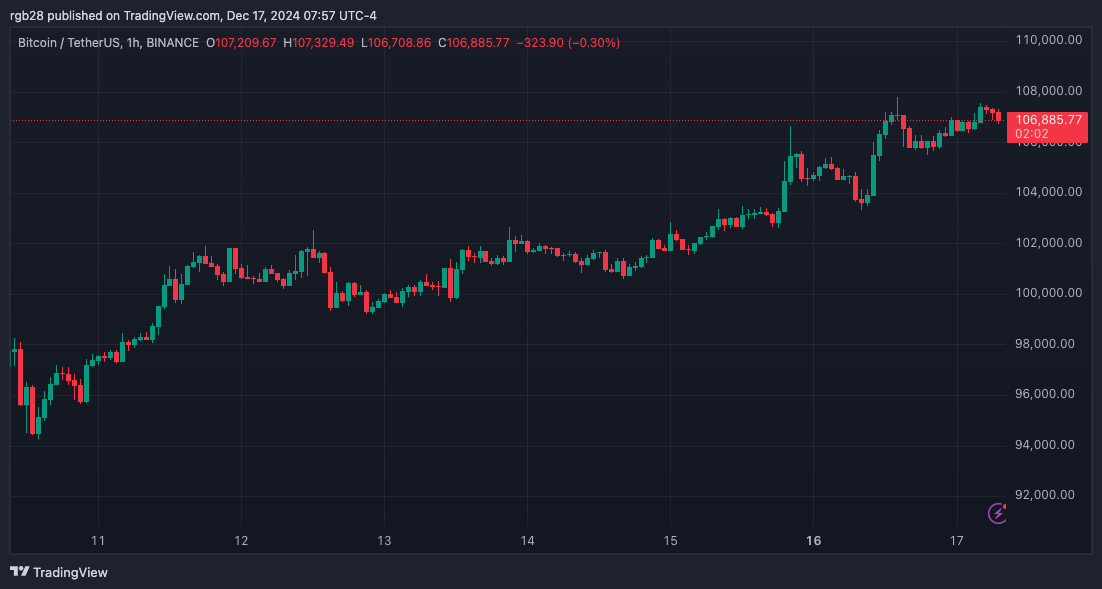Este artículo también está disponible en español.
As we approach the end of the year, Bitcoin (BTC) continues flying to new highs, setting bullish expectations for the rest of the cycle. Bitfinex’s latest reports suggest when BTC’s peak could come and how much climbing might be left for the flagship crypto.
Related Reading
Bitcoin’s ‘Unique’ Cycle
In its latest Alpha Report, Bitfinex highlighted the crypto industry’s big strides in adoption and mainstream recognition this year, which have differentiated this cycle from previous ones.
Notably, the launch and increasing institutional demand of Bitcoin and Ethereum spot exchange-traded funds (ETFs) have surpassed expectations and attracted a “new class of investors” to the crypto space.
Per the report, this cycle has been “unique” as these new investors brought by ETFs and increasing confidence in the sector sent BTC’s price to a new ATH ahead of the Halving event, historically leading the flagship crypto to a new high after 5-7 months.
The industry also saw a growing interest in diversifying national reserves with cryptocurrencies, with several jurisdictions worldwide considering implementing a Strategic Bitcoin Reserve after the flagship crypto’s recent performance.
According to Bitfinex analysts, these factors have kept BTC’s corrections smaller than other cycles and will likely continue this trend for the rest of the bull run:
In the current bull cycle, which began in mid to late 2023, Bitcoinʼs corrections have been smaller, particularly since the launch of Bitcoin ETFs in early 2024. With institutional and ETF demand providing consistent buying pressure, we expect this trend to continue, keeping future corrections limited and potentially shorter in duration.
Moreover, the upcoming crypto-friendly US administration added to the growing bullish sentiment surrounding the industry, leading to the massive post-election rally. As a result, the crypto market has grown 130% year-to-date (YTD) to a market capitalization of $3.69 trillion, increasing nearly 70% this quarter.
What’s Next For Bitcoin This Cycle?
The report noted Bitcoin’s performance, highlighting its 573% surge from its 2022 low of $15,487. The flagship crypto has also seen an increase of 130% year-to-date (YTD), fueled by this year’s industry achievements.
Earlier this month, Bitcoin broke past the $100,000 barrier for the first time, setting a new ATH closer to the $110,000 level on Monday. According to Bitfinex, the cryptocurrency still has several levels to climb in 2025, as historical data indicates that the market is mid-cycle.
This data suggests BTC’s price will likely peak around Q3 and Q4 2025, as it tends to do approximately 450 days post-halving. Meanwhile, metrics like Market Value to Realized Value (MVRV), Net Unrealized Profit and Loss (NUPL), and the Bull-Bear market indicator signal that “we remain in the bull phase but far from euphoric peaks.”
Bitfinex also explained that the Pi Cycle Top Indicator has historically been effective in timing cycle highs, forecasting the peaks with a three-day window. The previous cycle’s predictions indicate that Bitcoin could peak between mid-2025 and early-2026.
Related Reading
If it follows the 2021 cycle pattern, BTC could see its price experience a 40% increase to $339,000 and peak around June or July 2025. Nonetheless, the report notes that the flagship crypto has been on a trend of diminishing returns over the cycles.
Based on this, Bitcoin’s price might see a 15% to 20% increase to the $160,000-$200,000 range instead. However, if the cryptocurrency mirrors 2017’s cycle pattern, BTC’s rally could extend until January of 2026, peaking at $229,000 with similar diminishing returns.
As of this writing, BTC is trading at $107,729, just 0.3% below its ATH.

Featured Image from Unsplash.com, Chart from TradingView.com
Source: https://www.newsbtc.com/news/bitcoin/bitcoin-could-peak-between-160000-and-290000-if-these-historical-patterns-repeat-report/